* You are viewing Posts Tagged ‘History of Science’
James Brown
October 04, 2012
Events, Front Page, Podcasts, Project Updates, Publications
Tags: Droz, Editions, History of Scholarship, History of Science, Joseph Justus Scaliger, Religion, Sixteenth Century

The Correspendence of Joseph Justus Scaliger (8 volumes) has just been published by Droz. Edited by Paul Botley and Dirk van Miert, with supervision, advice, and coordination from Henk Jan de Jonge, Anthony Grafton, and Jill Kraye, the simultaneous appearance of all eight volumes of this major early modern corpus represents one of the most impressive scholarly achievements of modern times (work on Scaliger’s correspondence only started in earnest in 2004).
The critical edition contains nearly 1,700 letters sent to or by the French polymath, all of which are presented alongside a complete scholarly apparatus as well as English synopses. Scaliger’s correspondents include such luminaries as Dominicus Baudius, Tycho Brahe, Isaac Casaubon, the Dousa and Dupuy families, Daniel Heinsius, Johannes Kepler, Justus Lipsius, Claudius Salmasius, Jacques-Auguste de Thou, Marcus Welser, and Joannes Woverius. The edition was supported by the Andrew W. Mellon Foundation and (via Anthony Grafton’s Balzan Prize) the Balzan Foundation, with additional contributions from London’s Warburg Institute, the Scaliger Institute of the University of Leiden, and a number of Dutch societies and foundations.
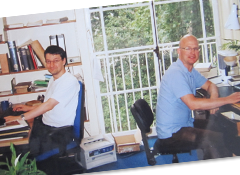
No let-up in the pace: editors at work
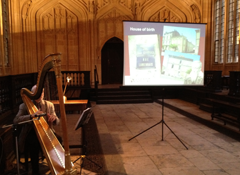
The scene is set for the reception
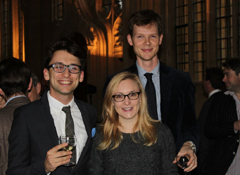
The next generation of edition-makers
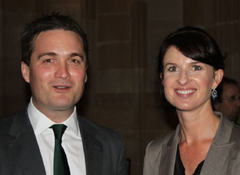
Rhodri Lewis and Sarah Rivett
This major publishing event was celebrated at the second of two publisher-sponsored drinks receptions at our latest conference Communities of Knowledge: Epistolary Cultures in the Early Modern World (20-22 September, 2012). Nearly one hundred delegates and guests assembled in the Bodleian Library’s magnificent Divinity School to toast the launch, where they were treated to wine, cocktail snacks, music from professional harpist Stephen Dunstone, ‘The Path to Scaliger: An Intellectual Journey’ (an animated presentation created especially for the occasion by Dirk), and speeches from Anthony Grafton and Max Engammare, Director of Droz. In related news, metadata from the edition is currently being prepared for inclusion in our union catalogue Early Modern Letters Online, while Dirk and Paul can be heard discussing the Scaliger corpus in their joint contribution to our 2010 seminar series.
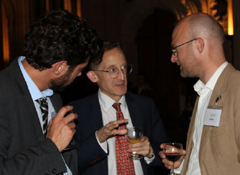
Jan Loop, Noel Malcolm, and Dirk
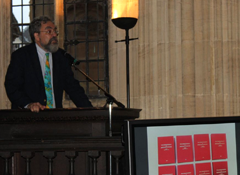
Anthony Grafton’s address
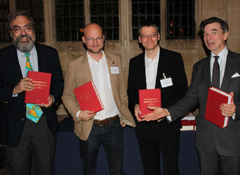
Not pictured: four more volumes
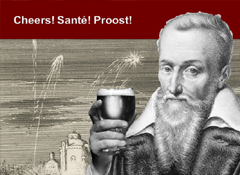
Scaliger raises a glass
We congratulate Paul, Dirk, Henk Jan, Anthony, Jill, and Max (and thank them, as well as Wilma Minty and the rest of the Bodleian’s Historic Venues team, for their help with the reception), and wish the edition every success! For more information and to order online – in hard copy or electronic format – please visit the publisher’s website or download the flyer (pdf).
James Brown
September 24, 2012
Events, Exhibitions, Lectures, Project Updates
Tags: Animals, Book History, Conchology, Gender, History of Science, Illustration, Martin Lister, Natural History, Seventeenth Century, Women
Post updated to include photographs
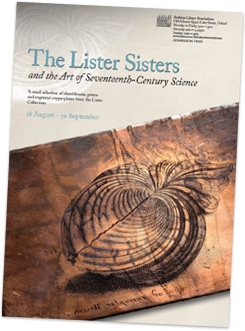 Our Martin Lister Research Fellow Anna Marie Roos has curated a small exhibition entitled ‘The Lister Sisters and the Art of Seventeenth-Century Science’, which will run in the Proscholium of the Old Bodleian Library from 18 August to 30 September (the poster can be downloaded here [pdf]). The free display showcases a unique set of drawings, prints, and copperplates of molluscs and their shells, (re)discovered among the library’s holdings by Anna Marie in 2010, which formed the basis for the illustrations in Martin Lister’s conchological magnum opus, the Historiae Conchyliorum (1685-92). Prepared by Lister’s teenage daughters, Susanna and Anna, the materials shed light on representational conventions within late seventeenth-century natural history, as well as on the gendered nature of illustrative practice in this boom era for lavishly illuminated scientific books. Anna Marie will also be giving a free lecture on ‘The Art of Science: The Rediscovery of the Lister Copperplates’ at 1pm on Wednesday 19 September in the Bodleian’s Convocation House (more info and booking on the library website). Further details of both events on The Conveyor.
Our Martin Lister Research Fellow Anna Marie Roos has curated a small exhibition entitled ‘The Lister Sisters and the Art of Seventeenth-Century Science’, which will run in the Proscholium of the Old Bodleian Library from 18 August to 30 September (the poster can be downloaded here [pdf]). The free display showcases a unique set of drawings, prints, and copperplates of molluscs and their shells, (re)discovered among the library’s holdings by Anna Marie in 2010, which formed the basis for the illustrations in Martin Lister’s conchological magnum opus, the Historiae Conchyliorum (1685-92). Prepared by Lister’s teenage daughters, Susanna and Anna, the materials shed light on representational conventions within late seventeenth-century natural history, as well as on the gendered nature of illustrative practice in this boom era for lavishly illuminated scientific books. Anna Marie will also be giving a free lecture on ‘The Art of Science: The Rediscovery of the Lister Copperplates’ at 1pm on Wednesday 19 September in the Bodleian’s Convocation House (more info and booking on the library website). Further details of both events on The Conveyor.
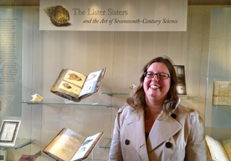
Anna Marie in front of the display
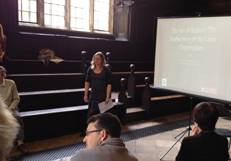
Lecturing in Convocation House
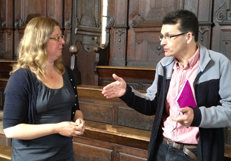
In conversation with Stephen Johnston
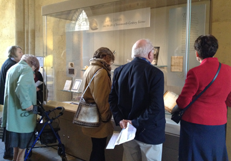
The exhibition proves a hit
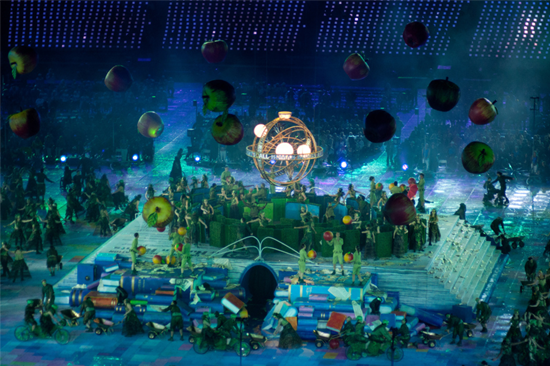
Core team member Anna Marie Roos (our energetic Martin Lister Research Fellow) was in action on BBC Radio 4 this morning dissecting last night’s magnificent science-themed opening ceremony to the Paralympic Games. The ceremony – called ‘Enlightenment’ – dramatized some key episodes in the intellectual development of Britain and Europe from 1550 to 1720, including a montage of giant rolling and floating apples inspired by Isaac Newton’s famous encounter with the fruit in his Lincolnshire garden. In the interview on the Today programme, Anna Marie – who has published on Newton’s reflecting telescope and Lister’s role in developing it – reflects on the significance of the apple incident for Newton’s theory of universal gravitation and unpacks some of the ceremony’s other, more obscure scientific references. The interview is available on the iPlayer (the segment starts at 2:19), while there’s also an interview with Anna Marie on the University’s arts blog.
James Brown
August 29, 2012
Projects and Centres, Websites and Databases
Tags: CKCC, Databases, Digitization, Dutch Republic, History of Scholarship, History of Science, Networks, Seventeenth Century, Visualization
Our good friends and colleagues from Circulation of Knowledge and Learned Practices in the Seventeenth-Century Dutch Republic (CKCC) at Huygens ING in The Hague have a shiny new website. Most excitingly, the revamped site contains a link and extensive supporting documentation for a closed beta (or prototype) of the much-anticipated Epistolarium, a virtual research environment in which users can explore and analyze metadata and full texts of c.20,000 scholarly Dutch letters from the period 1594-1707; see the video above for a rapid-fire introduction. As a long-standing collaborator of CKCC, we’ve been fortunate enough to get a sneak preview of this exciting new resource and will be providing feedback in advance of a full public release (and a resulting edited collection) in 2013. Congratulations to Charles, Guido, Walter, Wijnand, and the rest of the CKCC team!
Applications are invited for TWO AHRC Collaborative PhD studentships, commencing in autumn 2012, on the theme of Reconnecting Sloane: Texts, Images, Objects:
- Collecting and Correspondence: Sloane’s Papers and Scientific Networks (Supervised by Dr Arnold Hunt, British Library and Dr Anne Goldgar, King’s College London)
- Putting Nature in a Box: Sloane’s Vegetable Substances (Supervised by Dr Charlie Jarvis, Natural History Museum, and Professor Miles Ogborn, Queen Mary University of London)
- A third Doctoral studentship in the programme, Visualizing Natural Knowledge: Sloane’s Albums of Natural History Drawings (Supervised by Dr Kim Sloan, British Museum, and Dr Elizabeth Eger, King’s College London) has already been allocated to a named student.
Further particulars are available here (doc). Applicants can apply for both studentships, but must complete separate applications for each as outlined below.
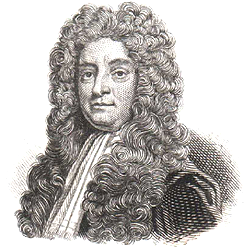 These studentships will focus on the collections of Sir Hans Sloane (1660-1753), which are now divided between the British Museum, the Natural History Museum and the British Library. The research projects will explore various aspects of Sloane’s collections in order to understand how his collecting practices were involved in the making of Enlightenment knowledge. The successful applicants will be expected to work closely with the partner institutions, and each other, in order to draw out the intellectual and material connections between the different parts of Sloane’s collections. They will also participate in the development of new finding-aids for the collections, leading to innovative forms of public engagement.
These studentships will focus on the collections of Sir Hans Sloane (1660-1753), which are now divided between the British Museum, the Natural History Museum and the British Library. The research projects will explore various aspects of Sloane’s collections in order to understand how his collecting practices were involved in the making of Enlightenment knowledge. The successful applicants will be expected to work closely with the partner institutions, and each other, in order to draw out the intellectual and material connections between the different parts of Sloane’s collections. They will also participate in the development of new finding-aids for the collections, leading to innovative forms of public engagement.
The award pays fees and an annual maintenance grant (currently £15,590 per year) and the partner institution will contribute up to £1000 pa research costs. The usual AHRC eligibility rules (pdf) apply to these studentships, including having an appropriate master’s degree by October 2012 and AHRC’s residential requirements.
For both studentships the closing date is 29 June 2012. Interviews will be held in London on 19 July 2012. Applicants will need to include a CV, two references, an academic transcript, and a 1000-word statement of purpose.
Philip Beeley
May 31, 2012
Events, Lectures, Project Updates
Tags: Astronomy, Editions, Europe, History of Science, Johannes Hevelius, Networks, Seventeenth Century, Theft
On 26 September 1679, while the astronomer Johannes Hevelius and his wife Elizabetha were spending a relaxing evening in gardens outside the gates of their home city of Danzig (Gdańsk), fire consumed their house in the old town. A large part of their possessions, books, personal manuscripts, and instruments, was destroyed; by the following morning the observatory which Hevelius had carefully erected on the roof of the house lay in ruins.
Much was irretrievably lost, but remarkably the letters he had exchanged with the learned men and women of Europe, including Kepler, Boulliau, Gassendi, Christiaan Huygens, Oldenburg, Wallis, and Kircher, together with his treasured collection of Kepler manuscripts, survived. At that time comprising thirteen volumes, the correspondence of Hevelius constitutes one of the great resources for the study and appreciation of early modern scientific networks.
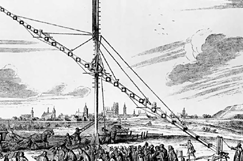
Hevelius’s 45m focal-length telescope.
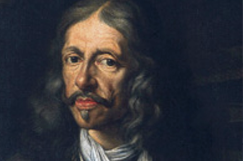
Johannes Hevelius.
Making this extraordinarily rich corpus available to the wider scholarly community is the task of a major collaborative editorial project currently underway in France, Germany, and Poland, of which I am pleased to be serving on the advisory committee. With most of the over 2,700 surviving letters now housed in collections at the BNF and the Bibliothèque de l’Observatoire in Paris, it was particularly fitting that the director of the French team Professor Chantal Grell (University of Versailles) – accompanied by Professor Robert Halleux (University of Liège) – should inform our third seminar series of the background and methodologies of this ambitious enterprise on Thursday 10 May. In a talk entitled ‘Editing the Correspondence of Johannes Hevelius: Networks, Themes, and Methodological Challenges’, Chantal first provided an overview of Hevelius’s life and letters, before giving a lively account of the complex archival afterlives of the astronomer’s epistolary collection following his death in 1687, including details of the letters famously purloined by Guillaume Libri in the mid-nineteenth century. Following a conspectus of Hevelius’s many correspondents, Chantal concluded with an analysis of the exemplary seventeenth-century scientific exchange between Hevelius and Pierre de Noyers, the secretary to the Queen of Poland. Following an interesting question and answer session – which included, inter alia, discussion of the benefits and challenges of balancing hard copy and digital outputs within large-scale correspondence projects – the evening came to fitting conclusion with a visit to the opening of the Renaissance in Astronomy exhibition at the Museum of the History of Science.
Seminars take place in the Faculty of History on George Street on Thursdays at 3pm. For future talks in the series, please see the seminar webpage. All are welcome!
















 These studentships will focus on the collections of Sir Hans Sloane (1660-1753), which are now divided between the British Museum, the Natural History Museum and the British Library. The research projects will explore various aspects of Sloane’s collections in order to understand how his collecting practices were involved in the making of Enlightenment knowledge. The successful applicants will be expected to work closely with the partner institutions, and each other, in order to draw out the intellectual and material connections between the different parts of Sloane’s collections. They will also participate in the development of new finding-aids for the collections, leading to innovative forms of public engagement.
These studentships will focus on the collections of Sir Hans Sloane (1660-1753), which are now divided between the British Museum, the Natural History Museum and the British Library. The research projects will explore various aspects of Sloane’s collections in order to understand how his collecting practices were involved in the making of Enlightenment knowledge. The successful applicants will be expected to work closely with the partner institutions, and each other, in order to draw out the intellectual and material connections between the different parts of Sloane’s collections. They will also participate in the development of new finding-aids for the collections, leading to innovative forms of public engagement.


 Join
Join 